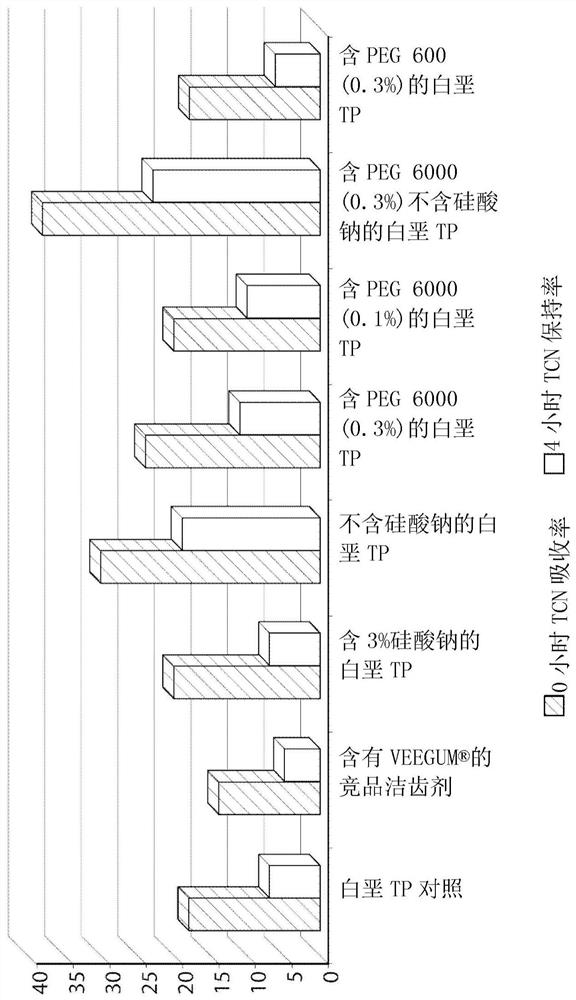Calcium-based dentifrice for enhanced absorption of active ingredients
A technology of antibacterial agent and average molecular weight, applied in the field of oral care composition, can solve the problems of increasing batch cycle time, increasing preparation cost, etc.
- Summary
- Abstract
- Description
- Claims
- Application Information
AI Technical Summary
Problems solved by technology
Method used
Image
Examples
Embodiment 1
[0109] Example 1 - Dentifrice Formulation
[0110] Seven dentifrice formulations A, C, D, E, F, G and H were prepared by mixing the ingredients in the amounts specified in Table 1 as described below. Include The competitor's dentifrice formulation is called Formulation B (Table 2).
[0111] A stainless steel vessel (SS vessel) equipped with a stirrer was charged with 70% sorbitol and heated to 60°C while stirring. Pasteurized, filtered, purified water was added to the sorbitol and heated to 85°C.
[0112] A premix containing carrageenan, sodium monofluorophosphate, sodium saccharin and sodium bicarbonate was slowly added to a separate container (SS container) to form a gel mass. The gel mass was mixed at a temperature ranging from 64°C to 65°C until no lumps were observed (approximately 20 minutes). 0.5% by weight pasteurized water was added to the SS vessel to compensate for water loss. The gelled mass was then transferred to a stainless steel mixing vessel (Alpro sti...
Embodiment 2
[0123] Example 2. Absorption and retention
[0124] Using saliva-coated hydroxyapatite (SCHAP) discs (i.e., the mineral phase of tooth enamel) as an in vitro experimental model of human teeth, the effects of polyethylene glycol (such as PEG 6000) in oral care compositions of the present disclosure on teeth were evaluated. Effect of surface absorption and retention of triclosan. In vitro assessments were found to correlate with in vivo delivery and retention of antimicrobial agents on oral surfaces.
[0125] To test the rate of triclosan uptake by SCHAP discs, parafilm-stimulated whole saliva was collected into beakers and clarified by centrifugation at 10,000 rpm for 10 minutes. Hydrate each hydroxyapatite disc with sterile water in a test tube. The water is then removed and replaced with 2 ml of clarified saliva. Salivary films were formed by incubating the discs overnight at 37°C with continuous shaking in a water bath. After this treatment, excess saliva was removed b...
Embodiment 3
[0128] Example 3. Results
[0129] As demonstrated in Table 2, high molecular weight polyethylene glycols such as PEG 6000 unexpectedly increased the rate of absorption (0 hours) and retention (4 hours) of antimicrobial agents such as triclosan. As shown in Table 2, formulations containing PEG6000 had better absorption at 0 hours than Control Formulation A on hydroxyapatite (HAP) discs. For example, as seen in Table 2, formulations containing PEG-6000 resulted in the presence of 24 μg on hydroxyapatite discs at 0 hours (Formulation E) compared to Control Formulation A (i.e. 18 μg Triclosan / HAP at 0 hours). , 20 μg (formulation F) and 38 μg (formulation G) of triclosan. see also figure 1 .
[0130] In addition, Table 2 also shows that formulations containing PEG 6000 had better retention than Control Formulation A at 4 hours on hydroxyapatite discs. For example, as seen in Table 2, formulations containing PEG-6000 resulted in the presence of 11 μg on hydroxyapatite discs ...
PUM
 Login to View More
Login to View More Abstract
Description
Claims
Application Information
 Login to View More
Login to View More - R&D Engineer
- R&D Manager
- IP Professional
- Industry Leading Data Capabilities
- Powerful AI technology
- Patent DNA Extraction
Browse by: Latest US Patents, China's latest patents, Technical Efficacy Thesaurus, Application Domain, Technology Topic, Popular Technical Reports.
© 2024 PatSnap. All rights reserved.Legal|Privacy policy|Modern Slavery Act Transparency Statement|Sitemap|About US| Contact US: help@patsnap.com










